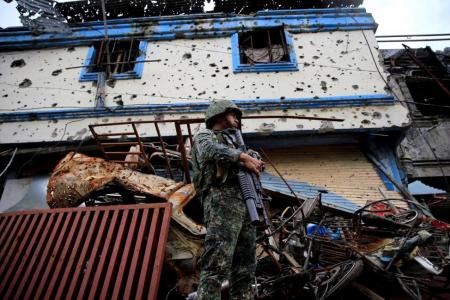Views: S-E Asia countries should worry about Marawi's terrorists
Insurgency in the Philippine city is a regional terror threat and Asean nations must take heed
Although it has slipped from the headlines, the conflict in the southern Philippine city of Marawi on the island of Mindanao rages on.
Several hundred terrorists led by the Maute brothers and the Abu Sayyaf managed to seize the city in May. Despite some initial success, Philippine security forces remain engaged in clashes with a small group of terrorists who are entrenched in the town's centre.
The capital city of Lanao del Sur province - population 200,000 - has been effectively destroyed by government aircraft in an effort to recapture it, with reconstruction estimated at US$1 billion (S$1.35 billion).
The drawn-out battle and the fact that 600 to 700 terrorists - which includes dozens from Malaysia and Indonesia - were able to coalesce essentially undetected is indicative of the armed forces' inability to counter this long-running insurgency.-For Asean, the issue is a much bigger one - terrorism will not be defeated in this region until Mindanao ceases to be a haven for regional militants. This will be achieved only when the island is at peace and on a path to sustainable development and autonomy.
For several decades, Mindanao has been where terrorists in the region could shelter, train and plan operations. Various local groups have harboured and supported these militants, such as the Moro National Liberation Front and Moro Islamic Liberation Front, to kidnap-for-ransom gangs such as Abu Sayyaf.
Mindanao also hosts the largest contingent of the communist New People's Army and a plethora of private political armies.
A sustainable solution to Mindanao's instability can be found only by addressing four fundamental factors:
SECURITY REBOOT
Local security forces have never effectively dealt with the various armed groups on the island. An overhaul of the armed forces and national police - specifically in terms of counter-terrorism and maritime security - will assist the effort to gain control of the problem.
Plus, a focus on robust civil affairs projects will assist in addressing the humanitarian crisis caused by the fighting.
BETTER GROWTH
Although many observers are celebrating the Philippines' record gross domestic product growth, economic development has not been "equitable" - it remains concentrated in southern Luzon.
Mindanao is rich in natural resources of all kinds but has historically been handicapped by poverty, poor governance and a lack of economic investment and opportunity. The government in Manila needs to ensure better distributed growth, not just faster growth.
REAL AUTONOMY
Former president Benigno Aquino re-launched a peace process to grant autonomy to key areas of "Muslim Mindanao", an electoral and continuing promise made by President Rodrigo Duterte, who has served as mayor of Davao City, also on Mindanao, for over 22 years.
But this process stalled after a botched police raid in 2015 to capture fugitive Malaysian bomb-maker Zulkifli, who was sheltering in Mindanao.
Much of the separatist violence since then is largely a result of the disrupted peace process, which has driven believers in a "Bangasmoro homeland" to see no other option but armed resistance.
ASEAN SUPPORT
Indonesian militants remain interested in plotting attacks on home soil, even as they have been drawn into the Mindanao front. But once the militants in Marawi City are overrun, there is a real risk of terrorism imploding once more.
The danger is that once aspirations for the creation of a "South-east Asia caliphate" are destroyed and militant groups disperse from Marawi, targeting and attack patterns will reach a new and more unpredictable phase, with regional implications that extend far beyond the southern Philippines.
The countries that will be affected need to better coordinate their counter-terrorism efforts, and the Philippines should request for assistance from Malaysia's and Indonesia's security forces to end this regional threat.
Dane Chamorro is a senior partner at Control Risks and a former resident of the Philippines. Bill Dickey is a retired United States Army colonel and former attache in Jakarta and Yangon. This article was published in The Business Times yesterday.
Get The New Paper on your phone with the free TNP app. Download from the Apple App Store or Google Play Store now


